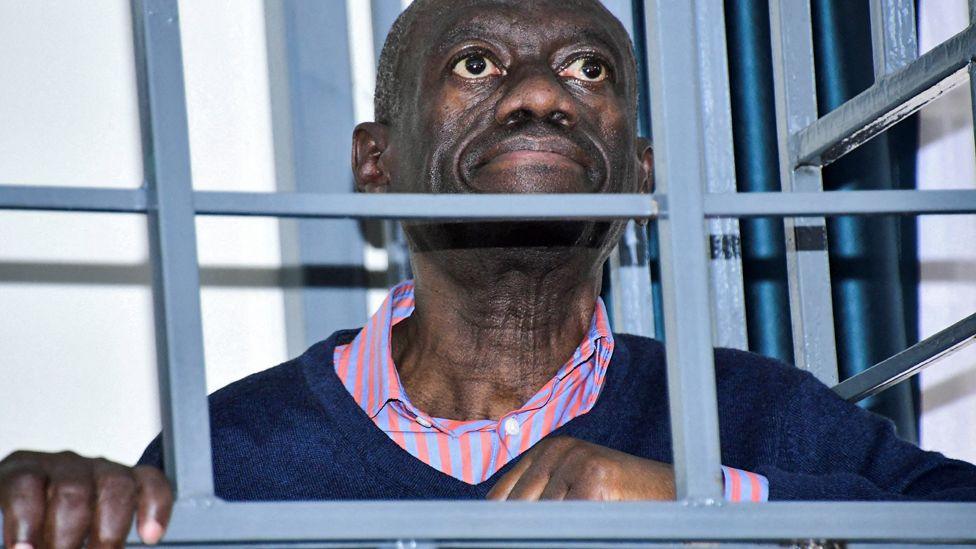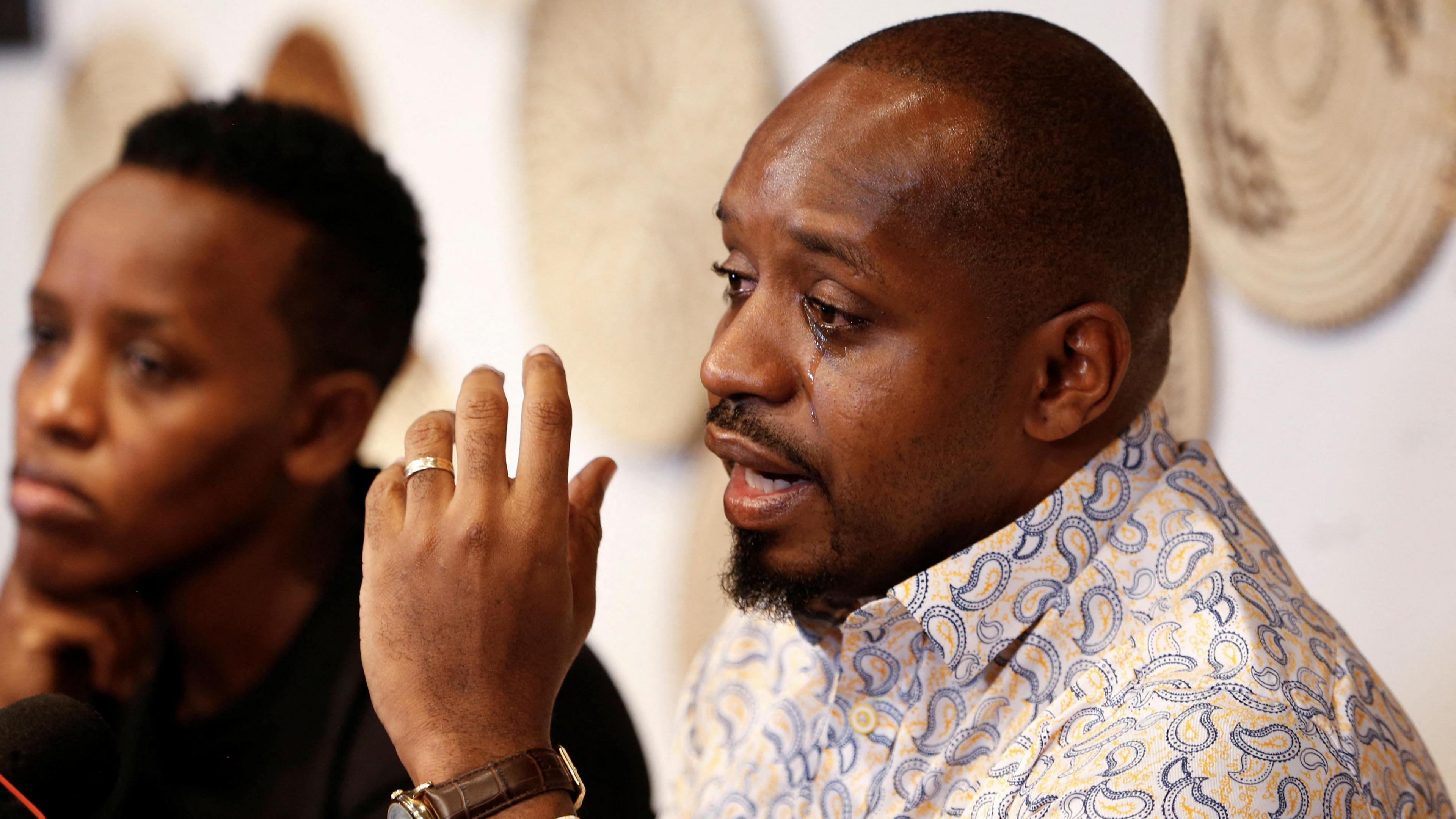Are East African governments uniting to silence dissent?

Kenya's crackdown on protesters over the last year has sullied its image as a beacon of democracy
- Published
Kenya has been hit by a recent wave of repression, tarnishing its reputation as a beacon of democracy in East Africa.
Critics fear that it is sliding down the path of her neighbours - Uganda and Tanzania, both of which are notorious for cracking down on dissent.
Kenya's laws are widely regarded as being more progressive - particularly in protecting fundamental freedoms like the right to protest.
But Kenya has witnessed an increasing crackdown on protests - the latest example being the killing of at least 10 people in nationwide demonstrations against President William Ruto's government while it attempted to ban live TV and radio coverage of the protests.
"Rogue Regime" - declared the headline of Kenya's respected Standard newspaper as it pointed out that young people had flooded the streets in defiant remembrance of those gunned down a year ago in mass anti-tax demonstrations but "Instead of a listening ear they were met with razor wire, armoured trucks and the cold grip of repression".
But as far as Interior Minister Kipchumba Murkomen is concerned, the police showed "remarkable restraint" as they foiled an "attempted coup".
"We condemn the criminal anarchists who in the name of peaceful demonstrations unleashed a wave of violence, looting, sexual assault and destruction upon our people," he said, accusing the protesters of attacking police stations and injuring 300 officers.
However, the Law Society of Kenya (LSK) condemned the police for their handling of the protest.
"The unnecessary aggression and brute force that culminated in the senseless loss of life and senseless destruction of property have no place in a free democratic society," it said.
The crackdown came just weeks after a 31-year-old blogger and teacher, Albert Ojwang, died in police custody. He was arrested after being accused of defaming a senior police officer - and died in detention of assault wounds, an autopsy found.
His death triggered a small protest in the capital, Nairobi, which police clamped down on and a street vendor, who was caught in the crossfire - shot at close-range, is fighting for his life in hospital.
The LSK denounced his shooting as unbefitting for "any sane democracy".
Its comment brought into sharp focus the fact that Kenya risks losing its status as a democracy that many Tanzanians and Ugandans envied – and drew inspiration from.
Tanzanian political analyst Nicodemus Minde said there had long been an "appreciation" among Tanzanians of the ability of Kenyans to "speak truth to power".
It was a view shared by Tanzania's main opposition leader Tundu Lissu who told the BBC last year that "We have not pressed hard enough for democratic reform".
"What Kenya did to build its democratic space is something we need to do," he said.
Having miraculously survived an assassination attempt after being shot 16 times in 2017, Lissu has become a symbol of state repression in Tanzania.
He is currently in detention, charged with treason for rallying his supporters under the slogan "No reform; no elections".
The government saw this as an attempt by Lissu to launch a rebellion – and he risks being sentenced to death if convicted.
The 57-year-old opposition leader sees his detention as an attempt by the Chama Cha Mapinduzi (CCM) party – which has been in power since independence in 1961– to clear its path to victory in presidential and parliamentary elections scheduled for October.
This perception has been strengthened by the fact that his Chadema party has been barred from contesting the poll after it refused to sign an electoral code of conduct that it believed would undermine its right to campaign freely.
The opposition in Uganda sees itself in a similar situation, pointing out that President Yoweri Museveni has been in power for almost 40 years, and – along with his son, Muhoozi Kainerugaba, who heads the army – is cracking down on political rivals in the build-up to elections in early 2026.
Ugandan opposition politician Kizza Besigye has been in detention since November, with the government wanting to try him for treason in a military court after accusing him of plotting to overthrow the government – a charge he denies.
We are staring at a regional crisis - not at an economic crisis, not a crisis of trade, but of democracy itself"

Although Kenya has an independent judiciary and holds regular elections that lead to power changing hands, Martha Karua – one of the country's most respected human rights lawyers, a former justice minister and the leader of a small opposition party – believes that democracy is under threat in all three East African states.
"We are staring at a regional crisis – not at an economic crisis, not a crisis of trade, but of democracy itself," she said at a recent press conference.
Activists like her are alarmed by the fact that more than 80 Kenyans have been abducted in the past year by people who never identified themselves, raising fears that this was the government's latest strategy to crush dissent after the protests over moves to increase taxes amidst a cost-of-living crisis.
There is also mounting evidence that Kenya is no longer a safe haven for Ugandans and Tanzanians, with security agencies from the three states apparently colluding to crack down on the opposition.
Besigye was in Nairobi for a book launch in November, when he vanished - only to surface four days later in a military court in Uganda.
The government in Uganda accused him of trying to negotiate an arms deal in Kenya to launch a rebellion back home and said he had been arrested in a cross-border operation carried out with the knowledge of Kenya's intelligence services.
Kenya's government initially denied this, saying it was unaware of the Ugandan operation on its soil, although Kenya's foreign minister recently told local media that "there were certain issues" about Besigye's visit in Kenya and "he had to go". He did not elaborate.

Uganda's Kizza Besigye was dramatically abducted while on a visit to Kenya in November and taken back to Uganda to face trial in a military court
About two months after Besigye's ordeal, exiled Tanzanian activist Maria Sarungi Tsehai said she was abducted by armed men in Nairobi who then, luckily for her, released her several hours later.
Ms Tsehai said she was manhandled and choked by four assailants who forced her into a vehicle.
"I am sure that the reason for the abduction was to get access to my social media and [because of] the whistleblowing job that I do," she said, as her abductors kept asking how to unlock her phone.
Ms Tsehai is a staunch critic of Tanzania's President Samia Suluhu Hassan, and has accused her government of bringing "tyranny back" to the country, despite promising reforms when she took office in 2021 following the death of her authoritarian predecessor, John Magufuli.
Karua said that despite the "backsliding" of democracy and human rights in East Africa, there was little concern about this internationally, with the African Union "silent", the United Nations offering "rhetoric - not redress", while the US - "a self-declared champion of liberty" - was facing its "own issues of liberty" under the administration of President Donald Trump.
Tanzania deported Karua and two Kenyan activists when they flew into the country in May to show solidarity with Lissu, while Kenyan activist Boniface Mwangi and Ugandan lawyer Agather Atuhaire were detained after being allowed to enter.

Kenyan Boniface Mwangi and Ugandan Agather Atuhaire allege they were sexually tortured while being detained in Tanzania last month
Following their release, both accused the Tanzanian police of sexually abusing them.
Tanzania's police denied the accusation, however amidst the outcry over the detention and deportation of foreign activists, President Samia issued a stark warning.
"If they have been contained in their country, let them not come here to meddle. Let's not give them a chance. They have already created chaos in their own country," she said.
To the dismay of activists, Kenya's President Ruto failed to condemn the alleged abuse and instead, apologised to the Tanzanian government.
"To our neighbours from Tanzania, if we have wronged you in any way, forgive us," he said.
"If there is anything that Kenyans have done that is not right, we want to apologise."
Macharia Munene, a Kenyan professor in international relations, told the BBC that Ruto's apology stemmed from his "perceived failure to keep people [Kenyans] in check".
He added that the Tanzanian government had become "jittery" of the potential influence of Kenyan activists on the October elections, with Ruto's government under pressure to "contain troublemakers".
For Kenyan activists the worsening repression in the three states has merely strengthened their resolve to fight back.
Mr Mwangi, one of Kenya's most prominent human rights campaigners, summed it up by saying: "If these people are united in oppressing their citizens, then we must be united in fighting to remove them from power."
You may also be interested in:

Go to BBCAfrica.com, external for more news from the African continent.
Follow us on Twitter @BBCAfrica, external, on Facebook at BBC Africa, external or on Instagram at bbcafrica, external
BBC Africa podcasts
- Attribution